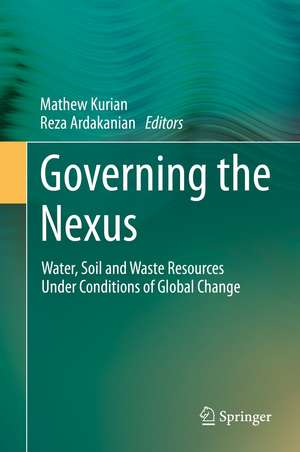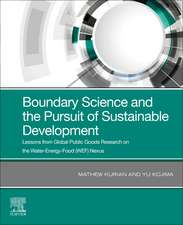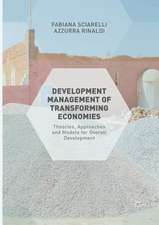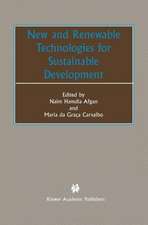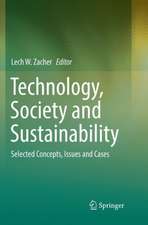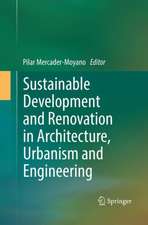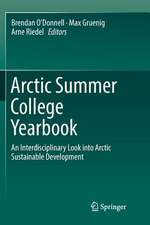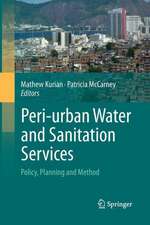Governing the Nexus: Water, Soil and Waste Resources Considering Global Change
Editat de Mathew Kurian, Reza Ardakanianen Limba Engleză Hardback – 17 noi 2014
| Toate formatele și edițiile | Preț | Express |
|---|---|---|
| Paperback (1) | 638.24 lei 6-8 săpt. | |
| Springer International Publishing – 23 aug 2016 | 638.24 lei 6-8 săpt. | |
| Hardback (1) | 644.49 lei 6-8 săpt. | |
| Springer International Publishing – 17 noi 2014 | 644.49 lei 6-8 săpt. |
Preț: 644.49 lei
Preț vechi: 758.23 lei
-15% Nou
Puncte Express: 967
Preț estimativ în valută:
123.32€ • 129.10$ • 102.04£
123.32€ • 129.10$ • 102.04£
Carte tipărită la comandă
Livrare economică 05-19 aprilie
Preluare comenzi: 021 569.72.76
Specificații
ISBN-13: 9783319057460
ISBN-10: 3319057464
Pagini: 230
Ilustrații: XX, 230 p. 39 illus., 28 illus. in color.
Dimensiuni: 155 x 235 x 17 mm
Greutate: 0.53 kg
Ediția:2015
Editura: Springer International Publishing
Colecția Springer
Locul publicării:Cham, Switzerland
ISBN-10: 3319057464
Pagini: 230
Ilustrații: XX, 230 p. 39 illus., 28 illus. in color.
Dimensiuni: 155 x 235 x 17 mm
Greutate: 0.53 kg
Ediția:2015
Editura: Springer International Publishing
Colecția Springer
Locul publicării:Cham, Switzerland
Public țintă
ResearchCuprins
Part I Global Change and the Nexus Approach to Management of Environmental Resources.- 1. The Nexus Approach to Governance of Environmental Resources Considering Global Change.- 2. The Water-Energy-Food Nexus-Enhancing Adaptive Capacity to Complex Global Challenges.- 3. The Nexus Approach to Managing Water, Soil and Waste under Changing Climate and Growing Demands on Natural Resources.- Part II Financing of Infrastructure Projects: Implications for Sustainability and Accountability.- 4. Inter-Governmental Fiscal Relations: Questions of Accountability and Autonomy.- 5. Results Based Financing and its Potential Role in Advancing the Nexus Approach.- 6. Life-Cycle Cost Analysis of Infrastructure Projects.- Part III Strategies for Implementation: Guidance on Resource Reuse and Data Visualization.- 7. Applications of Life-Cycle Cost Analysis in Water and Wastewater Projects: Lessons from European Experience.- 8. Designing Sustainable Reuse Systems: Towards an Agroecologyof Wastewater Irrigation.- 9. Data Visualization of Water Services: Applications for Nexus Governance in Africa.- 10. Policy is Policy and Science is Science: Shall the Twain Ever Meet?.
Notă biografică
Prof. Dr. Reza Ardakanian is the Founding Director of United Nations University Institute for Integrated Management of Material Fluxes and of Resources (UNU-FLORES^ry of Interior (1987–1989).
Dr. Mathew Kurian is Academic Officer and leads the Capacity Development and Governance unit at United Nations University Institute for Integrated Management of Material Fluxes and of Resources (UNU-FLORES). Prior to joining UNU-FLORES, he served as Senior Water and Sanitation Specialist at Water and Sanitation Programme (WSP) of The World Bank where he led policy advocacy efforts related to rural water supply, wastewater reuse, and climate adaptation options in secondary towns. He began his career as a Robert McNamara Fellow at the World Bank where his work on land tenure reform was hosted by the Tata Energy Research Institute (TERI), New Delhi.
Upon completing his PhD in Development Studies from the Institute of Social Studies (ISS), Erasmus University, The Hague, Netherlands, Dr. Kurian was employed as Associate Expert (Dutch Ministry of Foreign Affairs) at International Water Management Institute (IWMI-CGIAR) where he undertook assessments of soil and water conservation interventions in the Mekong and Nile river basins. In 2009 as member of faculty at UNESCO-IHE, Delft, Dr. Kurian led the development of a policy note on urban sanitation and the Millennium Development Goals (MDGs) for the Directorate General of International Cooperation (DGIS) in the Netherlands. While still at UNESCO-IHE, Dr. Kurian developed an online e-learning course on governance of water and sanitation services in developing countries.
He has published in the area of water institutions and policy and has mentored students of the MSc programme in environment and development planning while on the faculty of University College London (UCL). His experience in the field of capacity development includes training civil servants and managers of water utilities in Iran andTanzania, consulting assignments with the Asian Development Bank (ADB), Philippines and teaching undergraduate courses in human geography at the University of British Columbia (UBC) Vancouver, Canada. In his current function, he leads the design of public policy research, policy advocacy in support of evidence-based decision making and fund raising to support establishment of a nexus observatory network.
Upon completing his PhD in Development Studies from the Institute of Social Studies (ISS), Erasmus University, The Hague, Netherlands, Dr. Kurian was employed as Associate Expert (Dutch Ministry of Foreign Affairs) at International Water Management Institute (IWMI-CGIAR) where he undertook assessments of soil and water conservation interventions in the Mekong and Nile river basins. In 2009 as member of faculty at UNESCO-IHE, Delft, Dr. Kurian led the development of a policy note on urban sanitation and the Millennium Development Goals (MDGs) for the Directorate General of International Cooperation (DGIS) in the Netherlands. While still at UNESCO-IHE, Dr. Kurian developed an online e-learning course on governance of water and sanitation services in developing countries.
He has published in the area of water institutions and policy and has mentored students of the MSc programme in environment and development planning while on the faculty of University College London (UCL). His experience in the field of capacity development includes training civil servants and managers of water utilities in Iran andTanzania, consulting assignments with the Asian Development Bank (ADB), Philippines and teaching undergraduate courses in human geography at the University of British Columbia (UBC) Vancouver, Canada. In his current function, he leads the design of public policy research, policy advocacy in support of evidence-based decision making and fund raising to support establishment of a nexus observatory network.
Textul de pe ultima copertă
Based on papers and discussions surrounding the international kick-off workshop of the UNU-FLORES institute, held in Dresden, Germany in November, 2013, this book elaborates on key themes of the nexus approach to management of environmental resources- water, soil and waste.
The first three chapters address issues of global change and the nexus approach to environmental governance. Discussion includes concepts of poverty-environment nexus, adapative management, questions surrounding inter-sectionality, interactionality and hybridity. Chapters 4, 5 and 6 elaborate on the challenges of financing infrastructure projects, including questions of accountability and autonomy, in the context of decentralization and deregulation. Issues relating to the role of central transfers, taxes and tariffs and potential applications of results-based financing approaches to support sustainable service are also discussed. Chapters 7, 8 and 9 explore strategies for implementation, focusing on European experience with application of life-cycle cost analysis in water and wastewater projects, the use of an agro-ecology framework to support wastewater reuse in agriculture and applications of data visualization techniques for evidence based decision making.
The book concludes with a chapter by the editors, whose title expresses perhaps the most difficult question faced by development planners in addressing challenges of global change: Policy is Policy and Science is Science: Shall the Twain Ever Meet?
The first three chapters address issues of global change and the nexus approach to environmental governance. Discussion includes concepts of poverty-environment nexus, adapative management, questions surrounding inter-sectionality, interactionality and hybridity. Chapters 4, 5 and 6 elaborate on the challenges of financing infrastructure projects, including questions of accountability and autonomy, in the context of decentralization and deregulation. Issues relating to the role of central transfers, taxes and tariffs and potential applications of results-based financing approaches to support sustainable service are also discussed. Chapters 7, 8 and 9 explore strategies for implementation, focusing on European experience with application of life-cycle cost analysis in water and wastewater projects, the use of an agro-ecology framework to support wastewater reuse in agriculture and applications of data visualization techniques for evidence based decision making.
The book concludes with a chapter by the editors, whose title expresses perhaps the most difficult question faced by development planners in addressing challenges of global change: Policy is Policy and Science is Science: Shall the Twain Ever Meet?
Caracteristici
Provides a conceptual framework for discussing the nexus approach to environmental governance Discusses key science-policy challenges relating to the nexus approach Uses selected case studies to explore use of the nexus approach in integrated management of water, soil and waste resources Includes supplementary material: sn.pub/extras
